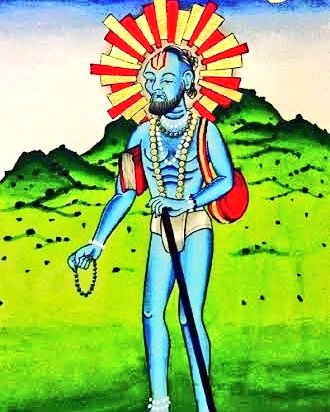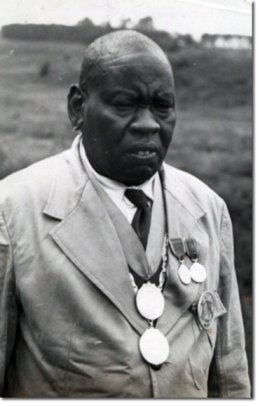unfortunate WWII was. As
@anti_contard recently noted, it is breathtaking to consider how many Whites (and people of all groups) perished in the industrialized carnage of that conflagration. The war’s effects have been vast, from geopolitics to informing the West’s post-1945
mythology (and those have frequently been intertwined). Overwhelmingly, “our guys” correctly point to the war’s awful legacy for our people.
Yet many of the same people who excoriate the crimson harvest of WWII and its consequences seem to be mired in a chauvinistic mindset when
it comes to something like 19th century colonialism. This tends to bubble to the surface as almost guttural riposte to the armies of the Woke, who seek to exploit the darker aspects of the history of European imperialism and colonization to shame and bully Whites. Whites have
become conditioned to fall into two camps today when confronted by these elements, both of which are counterproductive. The first camp is insufferable: Woke or liberal “White Saviorists” to use Matt Parrott’s term, people who typically use their status as the enlightened of their
race to endlessly tsk-tsk the grugs or racists in their midst who refuse to proverbially (or literally) kneel. They celebrate our oppression and tell us to take our medicine. The second camp tends to be made up of more intrinsically understandable people from _our_ vantage point,
insofar as they refuse to “cuck,” and wish to display pride for their forebears rather than cower in submission. The problem arises from their frequent answer to left-liberals’ demands to feel guilty by effectively saying, “King Leopold II Did Nothing Wrong.” They may be
well-intentioned—as surely _some_ of the left-liberal “White Saviorists” are—but their efforts ultimately provide the “good Whites” and non-Whites with plenty of ammunition with which to speedily label them “White Supremacists.” And indeed, many of them are “White Supremacists”—
at least in the realm of reflexively defending and even chauvinistically praising the most checkered episodes of their ancestors’ history.
Parrott is trying to break this vicious, destructive cycle. He’s (“cringe alert”) Daenerys Targaryen: he wants to break the wheel of White
Supremacy/White Saviorism.
What does that mean, in everyday practice?
Speaking anecdotally: an ancestor of mine, on my father’s side, was brutally murdered, and the gold he had pulled out of the earth like so many yellow teeth by a 19th century’s dentist, was stolen by a bunch
of American Indians. Am I to spit on his memory like the stereotypical blue-haired “libtard”? Of course not. The tenacity he exhibited in his life, from all accounts, was considerable. His courage & industriousness are to be revered. His story is 1 of many fine ones in my family.
However, his story is not only worth remembering for his gutsiness, but for casting an eye of discernment. His fate represents the inherent danger in attempting to settle a land with people of vastly different cultures, customs, traditions, languages, and manners inhabiting it.
Similarly, non-White resentment over historical atrocities & misdeeds usually performed in the name of “White nations” is something people in these circles will have to deal with intelligently going forward. Perhaps the empires of the West 150 years ago were substantially better
connected to their populations than the regimes of today, but this points to the curious complexity of the broader issue. The oppression we face is multidirectional, and our counterattack against it must be likewise if we are to one day overcome it. The reactionary cycle is
getting us nowhere. Instead, we must square the troublesome circle: namely, we as dissidents or White advocates find ourselves governed by states that do not serve our interests, and are indeed hostile to us. Yet to the Yemeni family devastated by U.S.-provided weapons wielded by
Saudi Arabia, or to the Iranians suffering now due to sanctions, these policies are at least vaguely performed “in our name.” Conversely, many White Nationalist/White Nationalist-adjacent actors and even some self-styled conservatives and “patriots” and paleoconservatives, who
recoil at what the U.S. is up to _today_ will look back with a kind of sickly, chauvinistic nostalgia over the good old days of installing Pinochet in Chile. The argument seems to be that the U.S. was wonderfully based until the last 30 years following the end of the Cold War.
There is no need to “cuck,” but there is also no need to further dig the hole representing the depth of the evil Whitey who is too arrogant to comprehend all of the wickedness he has unleashed throughout history. To be fair to the hypothetical “White Supremacist” in this scenario
it is not wrong to prioritize the crimes of the present over the hotly debated events of the past. Morally, it is correct. However, many Whites need to introduce some nuance to their storytelling. As Matt Parrott,
@Marcus4Punished, and
@ChineseNat were saying on Matt’s show,
“Radio Free Indiana,” on 12/4/20, much of the “our glorious republic!” or “our amazing empire!” rhetoric is a kind of White man’s “We Wuz Kangz” cure to the crippling depression, physical pain, obesity, broken homes, debt, and lack of social mobility raining down on our people.
To the extent that the republic or empire _were_ us, and we were they, this is simply no longer the case. We’re doing the regimes’ work for them when we cheer on the achievements of—at best—a regime that no longer exists.
Our position is unenviable. Only so many _Whites_ will
offer support. We are going to have to start forming alliances with similarly sincere and principled actors who do not look like us but who are waging their own fight against the aforementioned oppression.
Looking at our ancestors, we should unquestionably hold them in high
esteem. However: learning from our earthly predecessors is a critical part of loving them. Patrick Henry purportedly said, “I have but one lamp by which my feet are guided and that is the lamp of experience.” Moreover, it is not only important to remember those ancestors, but to
recall how others in history, both thousands of years ago and in the last century, remembered what came before them, too. Two “popular culture” examples come to mind. Firstly Homer’s Iliad, which is informed by a deep, unshakable love for the invading Greeks, but which provides a
great deal of empathy for the Trojans, and their champion Hector. Like later plays such as Aeschylus’s Agamemnon or Sophocles’ Antigone, tragedies which are defined as such chiefly because their primary characters fail to learn lessons that could have saved them from their fate,
unlike comedy which sees characters learn from their mistakes so that they may “course correct,” Greek storytelling as far back as Homer had this deeply critical view of Greeks, while constitutionally wreathed by love and pride.
The second example is John Ford’s 1948 Western
film Fort Apache, in which the director displays the heroic steadfastness of many of the White men (this being Ford, the vast majority of them are Irish—but that is Ford relaying his own ethnic pride and love) while simultaneously pulling no punches in demonstrating just how much
of a “bad deal” (Matt Parrott’s phrase) the American Indians received, a bad deal often entailing humiliating abuses and violence informed by prejudice. Ford loves his White American cavalrymen, and you pick up on the point fairly quickly that he cannot help himself from rooting
for them, but he has a heartfelt sympathy for the Indians that comes across almost equally strongly, as The Iliad treats the Trojans with respect and a kind of grudging love.
There is, finally, the question of utility. Few things probably harm the present system opposed to us
less than going online and reveling in the glories of the British Empire. As the aforementioned gentlemen in this long thread have discussed, the U.S. regime, but for the most obvious example, will happily channel White racism against minority groups into politically expedient
enterprises. Arabs or Far-Easterners (Chinese) can be placed in the crosshairs of “White Supremacists” for the sake of maintaining the U.S.’s stranglehold on the global hegemonic narrative.
U.S. Senator Marsha Blackburn recently provided everyone with an example of this. She
tweeted a few days ago: “China has a 5,000 year history of cheating and stealing. Some things will never change.” Many a rightist online has been saying that what the U.S. Senator meant was that the _Chinese government_ has such a history, and nothing will ever change, but does
anyone believe that outside of certain echo chambers? Unlike the U.S., China’s government performs certain functions for the citizens, however flawed it may be. Chinese identity is strong. It is an informative counterexample to Whites in the U.S., who cling to the idea that this
is still their empire, & that Washington, D.C. remains _their_ capital. It is vastly more logical for Chinese citizens to recoil in response to Blackburn’s comments than Whites in the U.S> becoming enraged when some speaker at a BLM rally says that the government is illegitimate.
Whites are running to defend their abuser time and time again because some non-White said something about their abuser that triggered them. It is a sickening feedback loop. If Whites have to be grabbed by the shoulders and shaken out of their stupor by some of Matt Parrott’s
rhetoric, so be it. One of the best tweets ever was Billy Cornpop Williams arguing that White people “need more Pastor Mannings” in their community demanding better and fewer grifting agents who tell them what they want to hear.
The most pressing question is not what Whites did
or not do in the 18th or 19th or 20th centuries. It is what we do now. Many are asking: what happens at the end of this “One Struggle” campaign? What is the endgame? Won’t Blacks immediately view Whites as untrustworthy comrades? Firstly, this is by its own parameters a
“nutrient-dense” movement: several forkfuls of organic spinach are better for you but possess dramatically fewer calories than a chocolate-peanut butter milkshake a. For “One Struggle” to work, it will require recruiting some of the best minds of Black, Latinos, Asians, & Whites.
The reciprocal understanding will be have to be that for each of us, our own particular group is our extended racial family, and comes first, but we will work together and at times on behalf of one another to advance the common goal of ending the oligarchical stranglehold on all
of us.
What “racial groups” do will always matter—will not lie to anyone here and suggest that a White should move into a “diverse” neighborhood—but for the purposes of “One Struggle,” it is more important to bundle together a coalition of pioneers. Assimilationist pluralism is
failing all around us, and ironically it seems the only way to form a resistance to it is to find the likeminded in disparate populations before we are all whipped together in the globalist capitalist processor. Population centers of Blacks and Whites will have markedly different
different desires for their own groups. The fear of Islamists emerging out of Dearborn, Michigan must be contextualized by recognizing that the oligarchs seek to break down ethnoreligious loyalties in immigrants just as they have in the White population. Speaking only for myself,
Parrott’s strategy seems the best out of the leading candidates for initiating the process of moving forward. There are pitfalls and details to work out, but right now we are all still in our respective dark corners, some of us furiously forming a kind of political prescription
that rings out to others, hoping that it connects in an almost anagogic fashion. Speaking plainly: what we know at the beginning of the 20202 is that the chauvinistic, reactionary pushback is a trap, a dead-end that is helping to keep our people intellectually imprisoned.
We must, indeed, “retvrn.” Greeks who were raised on the story of Achilles came to appreciate the duality of the choice with which the mythical figure was confronted. We can appreciate his desire to attain everlasting glory, just as we admire the ingenuity of a British Empire and
the people belonging to same, who went about the world, even if we morally often wish it had been channeled in another way. And we may wish Achilles had enjoyed a long, peaceful life with a family. Homer’s “lord of men” Agamemnon embodied the dilemma of heroism: he could not
commence the campaign against Troy until he had sacrificed his daughter. Empire has come at a heavy price for us in the West. A better response to left-liberal Whites shaming you for what your ancestors engaged in is not to scream that everything that Whites ever did was based,
but to point to the Bantu expansionism of Africa today, which has resulted in horrific consequences for other groups. No, do not go down the road of “you’re hypocritical,” as they enjoy reveling in it, but you can only do so much to correct hostile actors working for oligarchs.
The pertinent point is that the temptation of conquest and subjugation is with us, and with others, both in the past, and today. One would like to think that our ancestors would look at us, and wish for us to attempt to set certain things right. Repudiating the past is not
necessary (nor is it wise); doing everything in our power to build a better future as we approach the endpoint of the greatest expansion of credit in history during the Boomers' rise, an emphatic end to Francis Fukuyama's "End of History," assuredly is. Gasconading over Whites'
many triumphs should be wedded to mounting an attack on the neoliberal system that is also well aware of their mistakes.
"One Struggle” may appear to be a kind of retreat to some, but if nothing else give it a fair hearing before you dismiss it. For this path demands a sense of commitment and solidarity that is thrilling in its perilousness for those who want to enter a worthwhile fight.
________



























